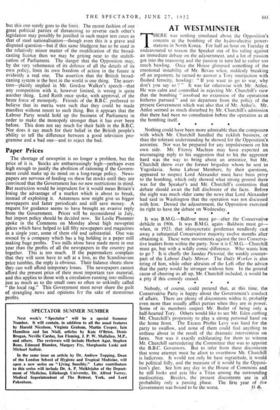AT WESTMINSTER T HERE was nothing simulated about the Opposition's concern
at the bombing of the hydro-electric power- stations in North Korea. For half an hour on Tuesday it endeavoured to reason the Speaker out of his ruling against an immediate debate on the adjournment, and a lot of passion got into the reasoning and the passion in turn led to rather too much bawling. Once the House glimpsed something of the emotional instability of Mr. Bevan when, suddenly breaking off an argument, he turned-to answer a Tory interjection with flushed ferocity, howling: " If you want to go to war, why don't you say so ? " It was far otherwise with Mr. Attlee. He was calm and controlled in rejecting Mr. Churchill's view that the bombing " involved no extension of the operations hitherto pursued " and no departure from the policy of the present Government which was also that of Mr. Attlee's. Mr. Attlee seemed as much disturbed by Mr. Churchill's admission that there had been no consultation before the operation as at the bombing itself. * ' * • • Nothing could have been more admirable than the composure with which Mr. Churchill handled the ticklish business, or than the tolerant understanding he showed for the Opposition's anxieties. Nor was he prepared for any impulsiveness on his own side. Mr. Fitzroy Maclean may have expected an encouraging reply to his suggestion that to hit the aggressor hard was the way to bring about an armistice, but Mr. Churchill threw over the former brigadier whom he sent to Yugoslavia. Some Labour Members, by their questions, appeared to suspect Lord Alexander must have been privy to the bombing, which only showed what strong ground there was for the Speaker's and Mr. Churchill's contention that debate should await the full disclosure of the facts. Before the night was much older came the news that Lord Alexander had said in Washington that the operation was not discussed with him. Denied the adjournment, the Opposition exercised its right to have the debate on Wednesday. • * • * It was B.M.G.—Balfour must go—after the Conservative debacle in 1906. It was B.M.G. again—Baldwin must g6— when, in 1923, that idiosyncratic gentleman needlessly cast away a substantial Conservative majority twelve months after obtaining it. These were movements against the two Conserva- tive leaders from within the party. Now it is C.M.G.—Churchill must go, but with a wildly comic difference. Who wants him to go ? It is chiefly the Sunday Pictorial, the weekly counter- part of the Labour Daily Mirror. The Daily Worker is also tiring of him, while other altruists of the Left offer the advice that the party would be stronger without him. In the general cause of cheering us all up, Mr. Churchill included, it would be a pity if this comedy ceased. • * • -- • Nobody, of course, could pretend that, at this time, the Conservative Party is happy about the Government's conduct of affairs. There are plenty of discontents within it...probably even more than usually afflict parties when they are in power. Some of its members suspect Mr. Butler of being only a half-hearted Tory. Others would like to see Mr. Eden curbing Mr. Churchill's propensity to play a strong personal hand on the home front. The Excess Profits Levy was hard for the party to swallow, and none of them could find anything to enthuse about in the result of the dramatic intervention on fares. Nor was it exactly exhilarating for them to witness Mr. Churchill surrendering the Committee that was to appoint the B.B.C. Governors. But to infer from these discontents that some attempt must be afoot to overthrow Mr. Churchill is ludicrous. It would not only be base ingratitude, it would be political folly, and the measure of it would be the Opposi- tion's glee. See him any day in the House of Commons and he still looks and acts like a Titan among the surrounding mediocrities. Besides, the present discontents ate in all probability only a passing phase. The first year of this Government was bound to be the worst. H. B.


































 Previous page
Previous page